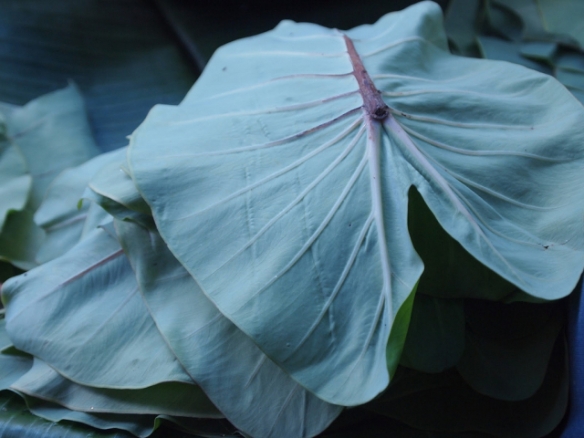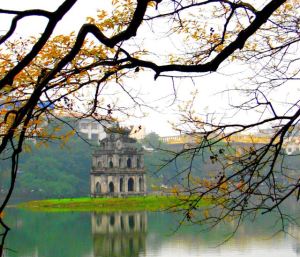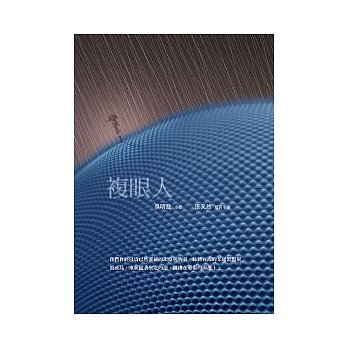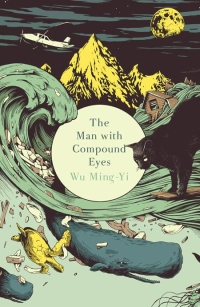There are many islands strewn across the Pacific, they withdrew from the world, and hoped never to be found. The footsteps of the Han quietly snuck up upon them however, their persuasive words laced with the rhetoric of modernity and development. From Orchid Island to Yap, what does the trajectory of these footprints tell us?
Islands Spirited Away
Rumung, a name that doesn’t appear on any Chinese maps.
The islanders don’t like outsiders, so Rumung is also nicknamed the Forbidden Island – because outsiders are forbidden to set foot there.
Northwards from the Forbidden Island is Sippin, the Sunken Island. Rumour has it that the islanders were so reluctant to being discovered by foreigners that one hundred years ago, at the beginning of the modern era of world history, they decided to disappear into the watery depths together. To this day, Yap islanders who fish in that area can still hear roosters crowing, dogs barking and human voices. Looking northwards from the Forbidden Island, one can even see smoke from cooking fires rising underneath the low lying clouds.1
They hid themselves for fear of being discovered. Several hundred years ago, the Yap islanders were already proficient enough in the art of illusion, that they were able to conceal the entire island from the Spanish as they explored the Pacific. Compared with Palau, which from the 19th Century onward was to become the headquarters of the German and Japanese Empires for the Pacific region, Yap, “discovered” by the Portuguese as early as the 16th Century, seems, like a pebble, to have skimmed along the surface of world history, watching impassively as the fleets of ships passed by, quietly praying that the outsiders never discovered their island, that they never docked there.
“Field Research” or something like it
After the defence of my thesis proposal, I set out for Yap in Micronesia to carry out my doctoral field research.
Wading through the mud of taro fields there, I often wondered how my classmates carried out their field research? “Observation” seems to be a synonym of “”skiving off”. Apparently French structural anthropologists in the 1970s always carried out field research in small work teams: the botanists would focus on collecting samples, psychologists would employ their erudite techniques to divine the psychology of the native peoples, and the economic anthropologists went about measuring the surface area of the fields and the daily food consumption of the residents and so on. They would stay for no more than three months. After collecting enough samples, they would up sticks and leave.
Of course there was also Bronislaw Malinowski (1884-1942), who anglophone anthropologists look up to as creating a bench mark for field work; if his return journey hadn’t been delayed by the First World War, a paradigmatic approach involving long term individual field work might not have been created, the indigenous people, I fear, would not have been endlessly pestered by the solitary Pole in his gold-rimmed spectacles and the tribal mountain villages of Taiwan would not be brimming with graduate students, naïve or seasoned, dull-witted or passionate, thinking back to the great anthropologists that preceded them over the last hundred years, while struggling to survive in the field.
Nor would the leader of the anti-nuclear campaign, many years later, on an island named Orchid Island by the Han, called the Island of Men by the islanders, have asked me with gravity, ‘As the ethnic group you are researching and that have treated you as one of their own, reach a critical juncture between survival and extinction; how do you deal with the fact that, whether you’re aware of it or not, your research shall be used as a reference for development projects by government agencies or entrepreneurs?’
(The friendly nature of the islanders prevented them from saying ‘Actually we hate you anthropologists above all, above everyone.)
Why here?
Eight years ago, I was weeding the fields of a little island that locals call the ‘Island of Men’ and that the Han call ‘Orchid Island’. It was for a period of just under six weeks. Every day I would put on sun cream and follow an old couple into the fields, listening to an Mp3 of ‘Country Road’ whilst I weeded. After listening to the melody around forty times on loop I could make my way back home. Or perhaps it was even longer than that? Memory tends to fail me.
One day my father asked me what I was actually getting up to on the Island of Men? I replied truthfully that I was weeding, moving taro, and carrying out interviews.
Due to my father’s swarthy skin, I was never able to read his emotions on his face, but I knew at that instant that his expression had darkened just then.

“If you like working in the fields, I have a one hundred square yard patch of land near our ancestral home in the south, I can give it to you to plant vegetables on.”
“If you like taro so much, you can even plant taro there.”
“Actually, I really quite like taro.” my father would say.
I knew what my father had prevented himself from saying.
I’d already complained to my friend on the island. “My high school classmate is studying English Literature at Cambridge. Why am I here weeding the fields?”
My friend gave a chuckle, probably wondering where Cambridge was. Although he was only three years older than me, my friend still perhaps found it hard to understand the mindset of islanders from mainland Taiwan, just as I, even though I followed in their footsteps everyday as they came back and forth from the fields, found it hard to understand why the old people went to inspect and weed the taro fields and to make sure they were well irrigated, day in, day out – or rather, I only understood it rationally, just as I “knew” that their kinship system was bilineal with patrilineal tendencies. As the old people looked anxiously at the stalks and leaves of the taro plants and the rotten bodies of the taros themselves, inside I was just desperate to clarify the principle on which the social hierarchy was based.
“The taros have gone bad,” one old man said.
“The taro haven’t been good since the nuclear station came.”
Continue reading →

 」
」



